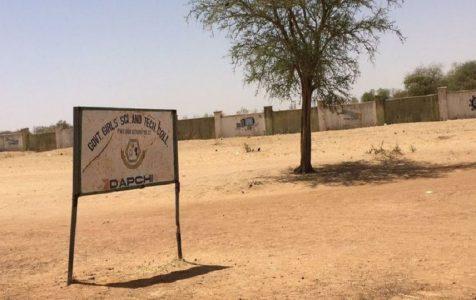
Islamic State and the kidnap of Nigerian schoolgirls from Dapchi
The recent kidnapping of 110 schoolgirls from Nigeria shows that Boko Haram is still a dangerous force in Nigeria – despite President Muhammadu Buhari claiming that the group had been technically defeated.
BBC Africa security correspondent Tomi Oladipo looks at the strength of the militant Islamists, and their links to the Islamic State group.
Not directly. However, a Boko Haram faction loyal to IS was behind the abductions, as well as that of the wives of police officers and university lecturers last year in Maiduguri, the main city in the north-east.
The faction is known as the Islamic State’s West Africa Province (Iswap) – a name aimed at showing that IS has expanded beyond the Middle East and North Africa.
It is officially recognised by IS, with Abu Musab al-Barnawi as its leader. He is believed to be the son of Boko Haram’s founder, Mohammed Yusuf, who was killed in police custody in 2009.
IS helps Iswap run a sleek propaganda campaign. Apart from this, direct links between the two appear to be minimal.
Despite the fact that Boko Haram leader Abubakar Shekau pledged loyalty to IS in 2015, the splinter group opposed his leadership style and operational methods, which included using child suicide bombers and attacking Muslims.
It is unclear which of the two factions is dominant within Boko Haram, but both operate across the Lake Chad Basin region.
The Shekau-led faction seems to be most active in the north-east, towards Cameroon, while Iswap’s terrain of operation seems to be closer to the border with Niger.
The government said it had relied on back channels – involving a “friendly country, [an] international organisation and trusted facilitators” – to secure the release of most of the Dapchi girls.
There is a precedent for this.
Last year, some of the more than 276 Chibok girls, whose abductions in 2014 drew global attention to Boko Haram, were freed by the Shekau-led faction with the help of the Swiss government and the International Committee of the Red Cross.
Their release was part of a swap, which saw the government freeing some top Boko Haram commanders.
After the release of the Dapchi girls, Information Minister Lai Mohammed told BBC Focus on Africa that the government was in talks with the militants to negotiate a ceasefire. This is despite the fact that Mr Buhari has previously insisted that there will be no negotiations with the militants.
“We are actually talking. That’s why we were taken aback when this abduction took place,” Mr Mohammed said.
He denied that any ransom had been paid, or any prisoners exchanged.
The government may feel that the successes in securing the release of the hostages could eventually lead to a ceasefire.
However, this goes against the core objective of the militants – to fight the government with the aim of creating an Islamic state.
This year started with Nigeria, Niger, Chad and Cameroon embarking on major offensive against Boko Haram. It was called Operation Deep Punch II, and the Nigerian army claimed significant successes.
There is no indication that the offensive will cease any time soon, though the government did say that operations were halted to open the way for the safe return of the Dapchi girls, who were dropped off in the town by the militants almost a month after the abductions.
Five of the girls reportedly died in captivity, while one – a Christian who refused to convert to Islam – was not released.
The military’s progress on the battlefield has led to some key roads reopening, allowing for the resumption of commercial activity in north-eastern Nigeria.
However, this could also make travel easier for Boko Haram, and it could return to areas from where it was driven out.
In the final analysis, there are not enough troops to fight Boko Haram, and to guard every town, village or school in north-eastern Nigeria – when they released the Dapchi girls they warned them not to return to school.
Relief operations are also threatened, as seen by the 1 March attack on United Nations staff in the town of Rann.
Abu Musab al-Barnawi has previously denounced Western-linked aid agencies tackling the humanitarian crisis, saying their efforts were a veiled attempt to Christianise the population.
His stance suggests that the conflict in north-eastern Nigeria is far from over.
Source: BBC





